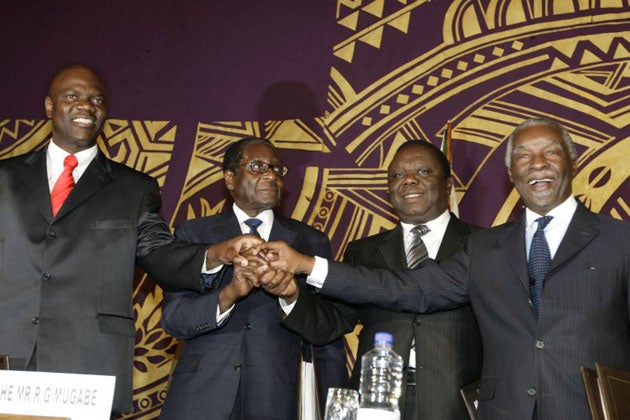Zimbabwe: The historic handshake
Mugabe and Tsvangirai sign deal, but clashes show divisions still run deep

President Robert Mugabe yesterday signed away total control of Zimbabwe after nearly three decades, entering into a power-sharing deal that it is hoped will jump-start the country's collapsed economy. But despite the handshakes and smiles for the cameras at the convention centre in Harare, clear signs of the bitterness and division remained.
MPs from the Movement for Democratic Change and the former ruling party, Zanu PF jeered at each other during the signing ceremony, while their supporters clashed outside the venue.
Thousands of Zimbabweans from both camps threw stones at each other, forcing the police to fire warning shots and set dogs on them. The crowd eventually succeeded in storming the barrier but were contained by a heavy police presence. There were no immediate reports of serious injuries.
Inside the hotel, Mr Mugabe was heckled as he read a long speech and made angry off-the-cuff remarks, sometimes in the vernacular Shona language.
The deal reached after a lengthy mediation effort by South Africa's President, Thabo Mbeki, ushers in an unwieldy government, with two deputies each for the Prime Minister and the President, in addition to 31 ministers. The allocation of the 31 ministries and 15 deputy ministries has still to be decided before a cabinet is announced this week.
The twin cabinet compromise, proposed by Mr Mbeki, left both sides of the power-sharing administration with some explaining to do. The ministers will sit in a "council" chaired by the new Prime Minister, Morgan Tsvangirai, as well as a "cabinet" overseen by his rival Mr Mugabe.
Mr Tsvangirai spoke first, saying: "I have signed this agreement because my belief in Zimbabwe and its peoples runs deeper than the scars I bear from the struggle ... Because my hope for the future is stronger than the grief I feel for the needless suffering of the past years."
The leader of a smaller splinter faction of the Movement for Democratic Change (MDC), robotics professor Arthur Mutambara, joins the government as Deputy Prime Minister.
The addresses by the three leaders reflected their differing philosophies and approaches on how to put back Zimbabwe on the road to recovery. While both Mr Tsvangirai and Mr Mutambara were forward-looking in their addresses and focused on the reconstruction and humanitarian tasks ahead, Mr Mugabe's address largely comprised of his favourite subject -- lampooning and blaming Zimbabwe's former colonial ruler for the chaos in the country. He criticised Britain for "seeking regime change" and imposing sanctions on Zimbabwe. "For this agreement to last there are salient principles that we must all uphold," he said in reference to his refusal to reverse his controversial land reforms by recalling evicted white farmers.
Major Western donors cautiously welcomed the deal, with the International Monetary Fund encouraging the new government to pronounce on clear policy commitments to tackle the economic crisis. Dominique Strauss-Kahn, IMF managing director, said: "We stand ready to discuss with the new authorities their policies to stabilise the economy, improve social conditions, and reduce poverty."
The European Union said it was ready to bring aid to Zimbabwe if the new government took measures to restore democracy and the rule of law.
Britain's Foreign Secretary, David Miliband, welcomed the agreement but said its details would have to be studied carefully. "The new government needs to start to rebuild the country. If it does so, Britain and the rest of the international community will be quick to support them," he said.
The first test for the new administration will come with its handling of the central bank. To gain the confidence of Zimbabweans, the new leadership must present a formula for knocking down prices and easing severe food, fuel and foreign currency shortages.
Join our commenting forum
Join thought-provoking conversations, follow other Independent readers and see their replies
Comments
Bookmark popover
Removed from bookmarks